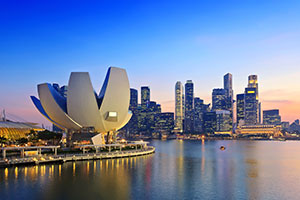Immerse yourself in two sumptuous destinations, each with diverse cultures, that have been at the crossroads of international trade for centuries, getting to know their many peoples and cuisines on a unique journey that reveals the rich contrast between the soaring architecture of major cities and the tropical beauty of highland landscapes.
Cameron Highlands
Cameron Highlands
The Cameron Highlands is a group of elevated rolling hills located in Pahang, West Malaysia and can match the size of Singapore. The area was named after its British expedition leader William Cameron in 1885. He discovered that the Highlands had a suitable climate to cultivate tea. This news traveled throughout Britain and soon after, English colonists settled at the Cameron Highlands. By 1930, the Cameron Highlands became the center of tea production and the biggest in Malaysia.
Visitors today can stay at what was once English Colonial houses preserved and modified into hotels and guesthouses, tour the Sungai Palas BOH Tea Estate, hike the scenic tea plantations down to Tanah Rata village, swim beneath Robinson Waterfall and visit the night market.
|
Destination Guide
|
Kuala Kangsar
Kuala Kangsar
A district of the royal town of Perak, Malaysia, Kuala Kangsar is cradled by the Perak River. Between 1877 and 1887, Sultan Shah erected his royal palace by the riverbank, which at the time was an odd place since it was an exposing threat of invasion. Natural causes was the palace's main problem almost getting swept by the floods. However, the palace was then moved further north away from the river bank. Historical Kuala Kangsar still sits quietly by the river bend and its growing communities follow. It is the birthplace of Malaysia's rubber industry and today, visitors can explore the luxurious royal palaces of gold-topped mosques, and fused architectures of Renaissance and neo-classical styles.
|
|
Malacca (Melaka)
Malacca (Melaka)
Malacca City, also known as Melaka, is situated 95 miles south of Malaysia's capital of Kuala Lumpur, in Malacca state. In the days of the great sailing ships, the port was one of the busiest on the peninsula. Shipping now is confined to coastal trade, because the harbour is inaccessible to ocean-going vessels. A large number of Chinese settled here, followed by masses of European colonizers, including the Portuguese, British and Dutch. Today evidence of all these colonies remain, both in the culture and architecture.
|
Destination Guide
|
Kuala Lumpur
Kuala Lumpur
Malaysia's capital rises like a vision from the deep jungles. Its fascinating array of architectural styles includes Malay stilt villages, Islamic minarets, Hindu temples, Chinese shop houses and the indescribable opulence of the Royal Palace. In the background rise the world's tallest buildings, the Petronas Twin Towers completed in 1996.
|
Destination Guide
|
Penang
Penang
Penang, or more properly Pulau Pinang, is the northern gateway to Malaysia
and also the country’s oldest British settlement. To the tourist industry, Penang
has been marketed for a long time as the Pearl of the Orient. Although Penang is best known for its beaches, there is much more here than just sand and sea. The island is considered a cultural and architectural gem with Chinese, Malay and Indian influences. Other sights include St. George’s Church - built in 1818 of classic Georgian architecture; Penang Hill - a 2,500-foot hill with a splendid view over Georgetown; Botanical Gardens - the 74-acre landscaped gardens featuring many indigenous and exotic plant species, a waterfall, jungle-clad hills and two species of monkeys, the macaque and dusky leaf monkeys; Golf Courses - The Bukit Jambul Golf & Country Club is located on Penang Island, and other golf courses in Province Wellesley on the mainland are the Penang Golf Resort and Bukit Jawi Golf Resort.
|
|
Singapore
Singapore
One of Asia's great economic successes, Singapore has fused diverse cultures into one dynamic nation.
Behind high-tech industries and high-rise buildings lives a society with an ingrained sense of conservative Confucian values. Beneath the westernized modernity beats a totally Asian heart. Strong beliefs center around extended families, filial piety, discipline, respect and Asian work ethics. Singapore’s name, meaning "Lion City," can be traced to the 13th century, and today there is the mythical Merlion, half-lion, half-fish, standing guard at the mouth of the Singapore River as the symbol of Singapore. A recent advertising campaign billed Singapore as "A Fine City."
|
Destination Guide
|






